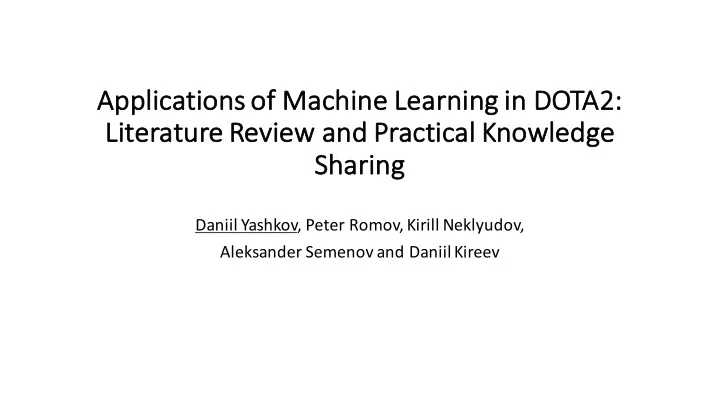

Applica cations of Mach chine Learning in DO DOTA2: : Literature Review and Pract ctica cal Knowledge Sh Sharing Daniil Yashkov, Peter Romov, Kirill Neklyudov, Aleksander Semenov and DaniilKireev
ML for E-Sport • Huge amount of data, collected automatically every day • Data is clean • It is a rapidly growing industry • Over $150 million market
Mu Multiplayer r Online Battle Arena (MO MOBA): Do Dota 2 • 2 teams, each one formed of 5 players • 1 st stage – draft stage : players from every team choose their heroes • 2 nd stage – each team is aimed at destroying “Ancient” building of the enemy • During the game each player improve their heroes, gaining gold, experience, killing enemies, buying items, etc. All this data is logging and collecting.
Multiplayer Online Battle Arena (MOBA): Dota 2
Data analysis in Dota 2 • Win prediction : o at the start of the game o after draft stage o real-time • Actions/strategies reccomendations for players • Player ranking • Smart camera for commentators • …
Draft stage win prediction • Input data • Match = 5 heroes for each team out of 113 • Target: win or lose? Whose pick is better?
Big variety of matches What is different in matches: Total amount of combinations 1. Players and their strategies 2. Picked heroes. Matches played since 2013 113 heroes pool Each player choose one hero
Al Algorithms • Features – 113 “hero” features for each team. " = 1 , if 𝑗 &' hero is picked by this team 𝑔 2 nd order factorization model • Algortihms: • Xgboost • Factorization machines • Logistic regression
Results • Set of picked heroes explains at least • 6% of information(Shannon) for very high skill players • 10% of information for normal skill
YA YASP dataset • Timeseries of heroes features (points every 30s) such as: • Gold • Experience • Items (purchasing) • Abilities • heroes trajectories (coordinates on map) • Special buildings(such as tower) states (destroyed or not)
Data: Task: ≈120 000 preprocessed matches • Predict winner using first 5 minutes of match • Final task for ML course as Kaggle In-class сompetition • One of the most popular kaggle in-class contest: 650 solo competitors (teams were not allowed) • A lot of different ideas, special features • Very good feedback
Winner’s solution 1. Use Logistic Regression instead of more complex models (e.g. Random Forest, GBDT) 2. Find good informative features • Statistics for each team • One-hot encoded picked heroes in the teams • First time team used some items (bottle, courier, ward) • Often combinations of heroes in the team: pairs and triples (need to be accurately selected, easy to overfit) • Aggregated hero characteristics
Realtime win prediction https://github.com/romovpa/dotascience-hackathon
Hackathon: • Realtime leaderboard during Shanghai Major • 35 teams competed • Usage of external data External data: • odds parsed from websites • Additional data from steam API • Parsed replays
Su Summary • Large dataset of Dota2 matches • Game outcome prediction using drafts stage auc = 0.66 – 0.7 (depending on skill) • Kaggle In-class contest: win prediciton having first 5 minutes auc = 0.8 • Dota Science hackathon – realtime win prediction baseline quality practically doubled
Recommend
More recommend